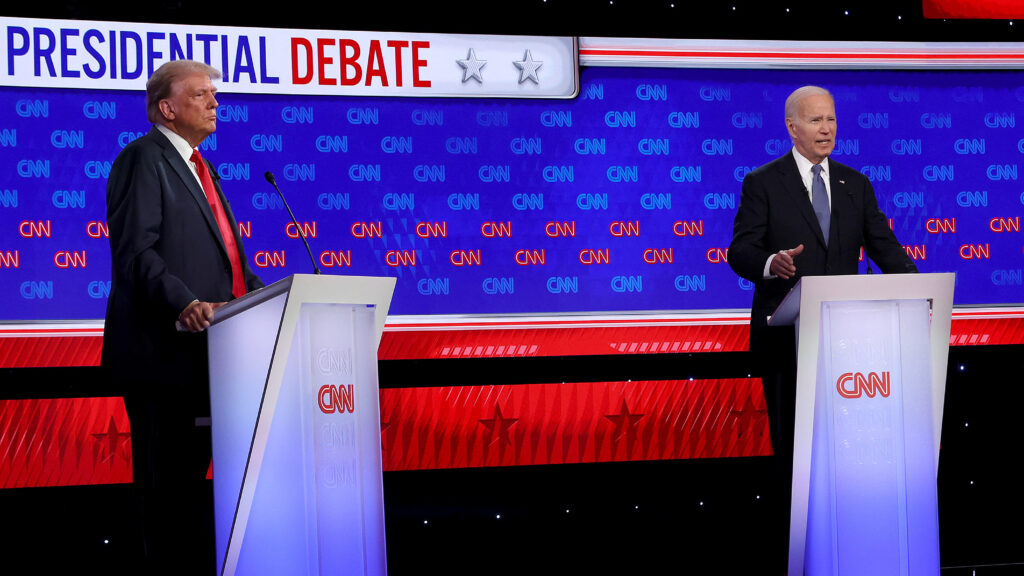You’re reading the web edition of D.C. Diagnosis, STAT’s twice-weekly newsletter about the politics and policy of health and medicine. Sign up here to receive it in your inbox on Tuesdays and Thursdays.
The post-debate debate
I know, no one wants to talk about the first 2024 presidential debate. But we’ve got post-debate polls, Democratic tension and real questions about where the race, and the conversation around health care policy, go from here. From “we finally beat Medicare,” to abortion rights, health programs’ solvency, and high drug prices, there was a surprising amount of health care debate Thursday night — but little of it substantive, or accurate.
advertisement
The president stumbled explaining his two most popular campaign talking points: Protecting abortion rights and lowering prescription drug costs. Biden was garbled when explaining Roe’s framework and erred multiple times as he talked about landmark legislation to negotiate drug prices and cap insulin costs.
The results poured in this weekend: More than 70% of voters said Biden should not be running for president, per CBS News polling. Somewhat stunningly, Biden fundraisers released a poll in the fallout that showed the president neck-in-neck with numerous other Democrats floated to take over the nomination. The message was that no one stepping in right now could win against former President Trump, and the campaign has since blasted Trump’s false claims about Medicare, Roe’s upheaval, and health care costs. But after Thursday, Trump’s campaign is also running with his message, despite a little over 30% of voters thinking he was telling the truth.
The next debate is Sept. 10. In the meantime, check out some of our coverage on what a second Trump presidency could look like for health care policy, and how Biden’s administration has battled an onslaught of care cases.
advertisement
The Chevron storm looming over FDA
The FDA’s power to make important regulatory decisions is in question after a Supreme Court decision on Friday that weakened federal agencies’ ability to interpret ambiguous laws. The ruling could mean headaches not just for the teams of lawyers and scientists at the FDA, but for the drug and device companies the agency is charged with regulating, a STAT dream-team on regulatory policy reports.
While the decision shouldn’t have major implications for FDA’s bread-and-butter task — approving drugs and devices — it could open up many of the agency’s regulatory efforts to legal challenge, leading to the one thing industry hates more than a bad policy: uncertainty.
The whole situation is striking, because as my colleagues write, the end of Chevron deference is seen, generally, as good for business. One industry that is definitely rejoicing is the tobacco and vape business, which took a victory lap on Friday, Nicholas Florko reported.
Is the kidney care demo a bust?
A few years ago, CMS launched a big experiment to see if financial incentives and penalties would improve care for people with end-stage kidney disease. So far, it hasn’t worked, a new study finds.
The model has been a historic effort, both because it’s the largest such experiment in the history of American health care and because — unlike previous CMMI pilot programs — it’s mandatory, Isabella Cueto writes.
And yet: Those sticks and carrots don’t seem to be doing much. In a paper published in JAMA Health Forum on Sunday, researchers report that providers enrolled in the experiment aren’t moving more patients to home dialysis or transplant than those in the control group. Read more about what that means and where care models may go from here.
House panels set their sights on Obamacare
A trio of House committee leaders dispatched letters Monday to HHS watchdogs, asking about a recent report — from a conservative think tank — estimating that as many as five million people are erroneously enrolled in fully-subsidized ACA marketplace plans.
Their math equals out to a cost of $15 billion to $26 billion annually for American taxpayers. At the heart of this probe is a longtime GOP complaint that Biden officials have relaxed enrollment rules and extended subsidies that keep costs low for enrollees. Between the two, many people who shouldn’t be eligible are reaping the benefits of no- to low-cost plans, the Republican committee chairs say.
“While individuals may reasonably misestimate their income at any given point, the scale of the problem suggests malicious intent from certain actors involved,” the chairs of House E&C, Ways & Means and Judiciary write in the letter. But they ask for a full report from HHS by Dec. 15 this year, leaving no room for legislative action this session.
What we’re reading
- Opinion: Psychiatrists aren’t fulfilling the social contract that subsidized their training, STAT
- Republican candidates are downplaying abortion, but it keeps coming up, KFF Health News/NPR
- Ascension is racing to unload hospitals as execs work to stem losses, STAT
- Dengue fever is surging worldwide. A hotter planet will make it worse, The Washington Post

